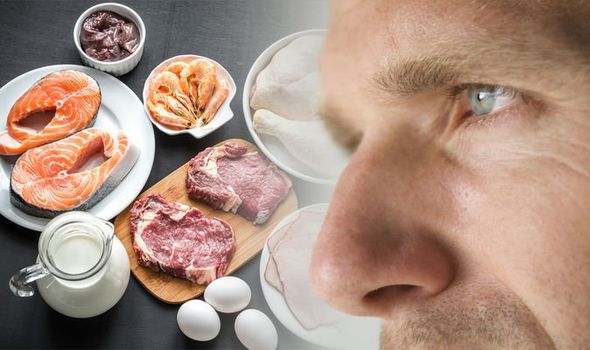Vitamin B12 deficiency symptoms: A sign of the condition is related to smell (Image: GETTY)
If vitamin B12 deficiency is left untreated, serious health complications can occur, including loss of physical coordination and cardiovascular disease.
But recognising the symptoms of the condition can help prevent these complications, and one to be wary of is loss of smell.
Tissues within the nose contain millions of nerve cells. These connect to and communicate with the brain and then translate into a person’s sense of smell.
If nerves become damaged as a result of vitamin B12 deficiency, this can disrupt signalling to the olfaction centres of the brain, dampening a person’s sense of smell.
Loss of smell is a symptom outlined by Harvard Health Publishing, part of Harvard Medical School.
Patrick J. Skerrett of Harvard Health explains: “Over the course of two months, a 62-year old man developed numbness and a ‘pins and needles’ sensation in his hands, had trouble walking, experience severe joint pain, began turning yellow, and became progressively short of breath.
“The cause was lack of vitamin B12 in his bloodstream, according to a cade report from Harvard-affiliated Massachusetts general Hospital published in The New England Journal of Medicine.
“It could have been worse – a severe vitamin B12 deficiency can lead to deep depression, paranoia and delusions, memory loss, incontinence, loss of taste and smell, and more.”
While loss of taste can occur in some people who are deficient in vitamin B12, others may experience a metallic taste in their mouth.
Having a metallic taste in the mouth can be caused by vitamin B12 deficiency, according to celebrity doctor Dr Andrew Weil.
“A metallic taste in the mouth is a common complaint and can be due to a variety of causes,” it states on his website.
“In the absence of other symptoms, it is unlikely that a metallic taste in your mouth indicates serious disease.
“Metallic taste is commonly associated with a deficiency of vitamin B12, D or zinc.
“You also might consider visiting your dentist, because the funny metallic taste in your mouth could be a symptom of gum disease.”

Vitamin B12 deficiency symptoms: Loss of smell can indicate the condition (Image: GETTY)

Vitamin B12 deficiency symptoms: A metallic taste in the mouth can be another sign (Image: GETTY)
Other symptoms of vitamin B12 deficiency
Other symptoms of the condition are listed by Bupa as:
- Feeling very tired
- Breathlessness even after a little exercise
- Heart palpitations
- Headaches
- A reduced appetite
- A sore mouth or tongue
The health organisation adds: “If you have vitamin B12-deficiency anaemia, you may also look pale or jaundiced (have a yellowy tinge to your skin and the whites of your eyes).
“As well as the symptoms of anaemia, vitamin B12-deficiency may cause symptoms related to your nerves. This is called vitamin B12 neuropathy. It may affect your movement and sensation, especially in your legs, cause numbness or pins and needles and decrease your sensitivity to touch, vibration or pain. It can also cause confusion, depression, poor concentration and forgetfulness.
“These symptoms aren’t always due to vitamin B12-deficiency anaemia, but if you have them see your GP.”
Avoiding vitamin B12 deficiency
Experts say adults aged 19 to 64 require around 1.5 micrograms a day of vitamin B12, and you should be able to get this through your diet.
Certain foods contain vitamin B12 and Harvard Health Publishing, part of Harvard Medical School, offers the “A list of B12 foods” on its website.
Five foods rich in B12 include:
- Beef – 3 ounces contains 1.5mcg of B12
- Eggs – 1 large egg contains 0.6mcg of B12
- Fortified cereal – one cup contains 6mcg of B12
- Salmon – 3 ounces contains 4.9mcg of B12
- Low-fat milk – 1 cup contains 1.2mcg of B12
Vitamin B12 is primarily found in almost all foods of animal origin. This means, those with plant based diets, such as vegans, are at risk of vitamin B12 deficiency if they don’t eat the right foods.
For vegans, they should look to the following food sources:
- Yeast extract (for example Marmite)
- Soya milk, yoghurts and desserts
- Breakfast cereals
- Certain brands of rice drinks and oat drinks
Vitamin B12 deficiency treatment
If you consume very little vitamin B12 foods you may be advised by your GP to take a vitamin B12 supplement or to have vitamin B12 injections.
This may be the case for pregnant or breast feeding women and vegan or vegetarians.
You may also want to consider taking vitamin B12 supplements. The Department of Health advises you don’t take too much as this could be harmful.
Taking 2 milligrams or less a day of vitamin B12 in supplements is unlikely to cause any harm.
Source: Vitamin B12 deficiency symptoms: Loss of smell could be one of the signs | Express.co.uk













